Related Research Articles

Sir Arthur Champernowne was an English politician, high sheriff and soldier who lived at Dartington Hall in Devon, England.
Boconnoc is a civil parish in Cornwall, England, United Kingdom, approximately four miles (6 km) east of the town of Lostwithiel. According to the 2011 census the parish had a population of 96.

Sir John Basset, of Tehidy in Cornwall and of Umberleigh in Devon was Sheriff of Cornwall in 1497, 1517 and 1522 and Sheriff of Devon in 1524. Although himself an important figure in the West Country gentry, he is chiefly remembered for his connection with the life of his second wife and widow Honor Grenville, who moved into the highest society when she remarried to Arthur Plantagenet, 1st Viscount Lisle KG, an illegitimate son of King Edward IV, and an important figure at the court of King Henry VIII, his nephew.
Margaret Grey was a Cambro-Norman noblewoman, the daughter of Reginald Grey, 3rd Baron Grey de Ruthyn, a powerful Welsh Marcher Lord, who was the implacable enemy of Owain Glyndŵr.

Sir Philip Courtenay of Powderham, Devon, was the senior member of a junior branch of the powerful Courtenay family, Earls of Devon.

Sir Philip Courtenay, of Powderham, Devon was the fifth son of Hugh Courtenay, 10th Earl of Devon (1303–1377). He was the founder of the cadet dynasty known as "Courtenay of Powderham", seated at the manor of Powderham, until then a former Bohun manor of little importance, whilst the line descended from his elder brother, the Earls of Devon of the mediaeval era, continued to be seated at Tiverton Castle and Okehampton.

Sir John Fowell, 2nd Baronet of Fowelscombe in the parish of Ugborough in Devon, was thrice elected a Member of Parliament for Ashburton in Devon, between 1659 and 1677. He fought in the Parliamentary army during the Civil War and following the Restoration of the Monarchy was appointed in 1666 by King Charles II Vice-Admiral of Devon.

Sir John Fowell, 3rd Baronet of Fowelscombe in the parish of Ugborough in Devon, was an English politician who sat in the House of Commons from 1689 to 1692.

Sir William Strode (1562–1637) of Newnham in the parish of Plympton St Mary, Devon, England, was a member of the Devon landed gentry, a military engineer and seven times a Member of Parliament elected for Devon in 1597 and 1624, for Plympton Erle in 1601, 1604, 1621 and 1625, and for Plymouth in 1614. He was High Sheriff of Devon from 1593 to 1594 and was knighted in 1598. In 1599 he was appointed Deputy Lieutenant of Devon. There is a monument to him in the parish church of Plympton St Mary.
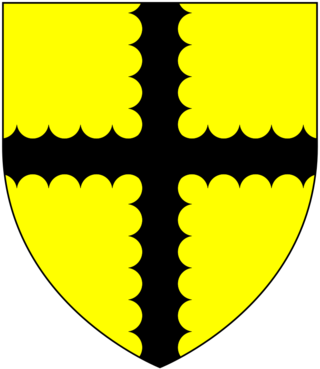
Sir Reginald Mohun, 1st Baronet of Boconnoc in Cornwall, was a prominent member of the gentry of Cornwall and an MP.

Sir John Cary, of Devon, was a judge who rose to the position of Chief Baron of the Exchequer (1386–88) and served twice as Member of Parliament for Devon, on both occasions together with his brother, Sir William Cary, in 1363/64 and 1368/69.

Philip Cary was an English landowner and politician from Devon.
Arthur Champernowne, of Dartington, Devon, was an English politician who sat in the House of Commons from 1715 to 1717.

Upcott is an historic manor in the parish of Cheriton Fitzpaine, Devon. The manor house, known as Upcott Barton is a mediaeval grade II* listed building notorious in the history of Devon as the place where in 1455 the murder of the lawyer Nicholas Radford by a mob directed by the Earl of Devon during the Wars of the Roses took place. In the grounds is a reproduction of an Iron Age roundhouse built circa 2014.

Sir Peter Courtenay of Ugbrooke in the parish of Chudleigh, Devon, was Sheriff of Devon in 1548/9.
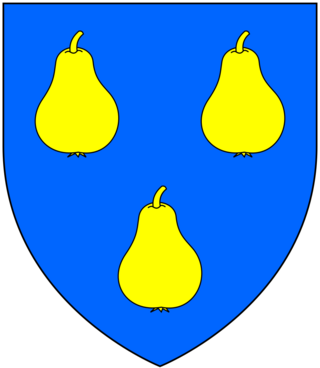
Sir Hugh Stucley (1496–1559) was the lord of Affeton in Devon, and Sheriff of Devon in 1545. His third son was Thomas Stukley, known as "The Lusty Stucley".
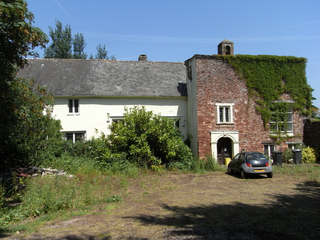
Blagdon historically in the parish of Paignton in Devon, England (today in the parish of Collaton St Mary), is a historic Manor, the seat of the Kirkham family from the 13th to 17th centuries. The manor house known as Blagdon Manor (House) (or Blagdon Barton) survives as a grade II* listed building about two miles west of the historic centre of the town of Paignton, situated behind the "Blagdon Inn" public house (former stables), and almost surrounded by the "Devon Hills Holiday Park" of caravans and mobile homes, set-back at the end of a short driveway off the A385 Paignton to Totnes road. The settlements or farms of Higher Blagdon, Middle Blagdon and Lower Blagdon are situated to the north of the manor house.
Flete in the parish of Holbeton in Devon is an historic manor. In 1810 it was called "one of the finest estates in the county of Devon". The present manor house known as Flete House was built in the 19th century incorporating some elements of an earlier Tudor house on the site.
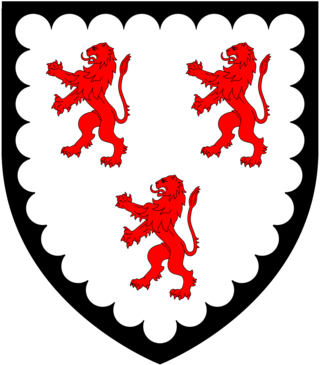
Sir John Kirkham (1472–1529) of Blagdon in the parish of Paignton, Devon, was Sheriff of Devon in 1523/4. He was one of the Worthies of Devon of the Devonshire biographer Prince (d.1723), who called him a "very free and liberal, ... prudent and discreet" benefactor of the town of Honiton in Devon.
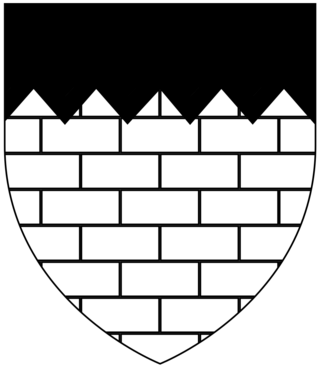
Walter Reynell, of Malston in the parish of Sherford, was an English landowner, administrator and politician from Devon who sat as MP for Totnes in 1447 and as MP for Devon in 1453.
References
- 1 2 3 4 5 6 7 8 9 10 Richardson, Douglas. Magna Carta Ancestry (2nd ed.). Douglas Richardson. p. 411. ISBN 9781461045205 . Retrieved 31 July 2022.
- 1 2 3 4 5 6 7 8 J. L. Vivian (1895). The Visitations of the County of Devon. For the author, by H. S. Eland. p. 162. Retrieved 31 July 2022.
- ↑ Mary D Lobel, ed. (1964). "Parishes: Aston Rowant". A History of the County of Oxford: Volume 8, Lewknor and Pyrton Hundreds. London. pp. 16–43. Retrieved 2 August 2022.
{{cite book}}: CS1 maint: location missing publisher (link) - ↑ J.S. Roskell; L. Clark, C. Rawcliffe, eds. (1993). "Chudleigh, Sir James (d.1401/2), of Ashton and Shirwell, Devon". The History of Parliament: the House of Commons 1386-1421. Retrieved 1 August 2022– via The History of Parliament Online.
- ↑ J. L. Vivian (1895). The Visitations of the County of Devon. For the author, by H. S. Eland. p. 189. Retrieved 31 July 2022.
- ↑ Vivian makes her the aunt rather than the daughter of Sir Richard.